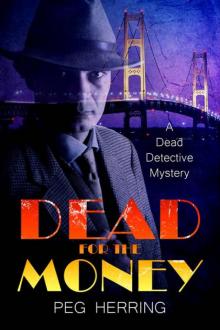- Home
- Peg Herring
The Dead Detective Agency (The Dead Detective Mysteries) Page 2
The Dead Detective Agency (The Dead Detective Mysteries) Read online
Page 2
Louisineau was the man’s name, and he spelled it for the detective. “No one ever gets it right. French, y’ know, like Louise-in-awe.” Mr. Louisineau had probably never been tall, but at eighty-plus he was shriveled and bent like grapevines in the land of his birth. His clothes, decades outdated, looked almost uninhabited. His pants were rolled up at the hems to accommodate a loss of height, and suspenders had been added to keep them up. The waistband gaped half-empty between the clasps. His bony head sat precariously on a skinny neck that was all chords. Only his ears hadn’t shrunk. They lay along his face like the fins of an angel fish. Frail and unsteady at best, he was stunned by the death of his neighbor as well.
Friends called her Tori, he informed Madison. She had moved in several months ago and within a week had knocked on his door and announced she intended to become his girlfriend.
“She was kiddin’, you know,” the old man said with a dry chuckle, “but we sorta took care of each other. She did stuff for me, and I paid her back with cookies. She loved my oatmeal cookies, said it made her day when she came home and smelled ’em baking.” Madison guessed the girl had waxed eloquent about the baked goods to make the old guy feel less beholden for her kindnesses.
Louisineau was anxious to tell his story, to get things rolling, he said, so they could catch the killer. He probably watched Law and Order reruns and assumed the crime would be solved neatly, like Jerry used to do it, but Madison already doubted that. If the old man’s assessment of Tori was correct, this case would be different.
The man’s account of the discovery of Tori’s body came with frequent clicking of false teeth that no longer fit his gums. “I heard a knock on her door about two, heard her answer. The walls in this place are like paper.” Madison made no comment, just nodded and took a drink of the soda the old man had insisted he get from the fridge. In his twenty years as a cop, he had learned to shut up and let them tell it the way they wanted.
“Anyways, I heard Tori answer. A man asked if she was Victoria Van Camp, and she said she was. Then I heard a funny sound, like somebody dropped something. I started for the peephole to see what was going on, but I’m pretty slow these days. The door slammed shut, and all I got was a glimpse of someone heading down the stairway, a guy with one of those black knit hats the punks pull way down till they look like morons.” He stopped, apparently considering further comment on the punks of the world, but decided against it.
“That’s all I saw, the back of his head disappearing down the stairs. I figured he delivered a package, something he set down heavy, but it’s Sunday, so that was a little bit odd. The door to Tori’s place was shut, so I didn’t think much of it.” His voice quivered and he stopped for a moment, determined not to seem weak but obviously distraught. After a moment he went on, voice under control. “Later I called to see if she’d walk Scruff.”
At the sound of his name, the dog raised his head, intelligent eyes focused on Louisineau. Again no invitation was forthcoming, so the dog went back to napping.
“She does—did—that now Arthur’s got me so bad. You know, Arthur-itis.” The old man held up a gnarled hand, fingers turned inward at odd angles. Madison nodded. Arthritis and osteoporosis, no wonder he was slow getting around.
“She didn’t answer the phone, but I knew she was home from earlier. I waited, thinking she was in the shower or something. Finally, I went over and knocked on the door, still no answer. It wasn’t like her to take naps or wear them headphones that keep you from hearing stuff. I got to thinking about the funny sound and the thump, so I called the station and that—” His lips almost said kid but he switched to “—officer there was real good about it. Didn’t give me no crap about was I sure, like I don’t know nothing. He came right up and knocked on her door himself. When she didn’t answer, he got the manager to let him look, and that’s how we found her.”
“She died instantly,” Madison told him. “You couldn’t have prevented it.”
The man’s head drooped as if from the weight of the discovery, and his deeply-lined face turned slack. He rubbed gnarled hands on his polyester pant-legs in agitation. “Who’d do that to a nice kid like Tori?” he asked Madison, looking up at him with red-rimmed eyes. Not knowing Tori but having known other “nice kids” with all kinds of secrets, Madison simply rose, shook Louisineau’s bony hand, and thanked him for the soda and his help.
Chapter Three
I Got Shoes
A few doors down from the room where Tori struggled with her questions, a striking man knocked twice, turned the knob, stuck his head inside a cabin, and said without preamble, “I might have a job for you.”
The occupant of the room lay on the bed, fully clothed. His feet, shoes and all, were carelessly crossed on the light-colored coverlet. Although he wasn’t handsome, the interest that registered on his face changed it, showing an appealing liveliness. He sat up, attention focused on his visitor.
“What do you need, Mike?” The voice was raspy and, combined with a yellow-stained index finger and a certain nervous reaching toward the mouth, signaled an ex-smoker. Something in the man’s manner hinted the “ex” part wasn’t by his own choice.
Mike stepped into the room, which echoed with emptiness. The only personality evident was a battered fedora thrown carelessly over a lamp in the corner. “How do you stay so long in a place and make no attempt to make it home?”
“What’s the point?” the man on the bed replied. “Tell me, and I’ll consider adding throw pillows and a piano.”
Mike raised a hand, conceding defeat. “A woman was murdered, and it’s your turn, if that’s the way it goes.” Mike hoped for a different result, but arrangements were made for all eventualities. “She’s only twenty-five.”
The thin shoulders drooped in disappointment. “Young ones are the worst,” he lamented. “All that crying.”
“I know, but we have to be prepared if she asks.”
The oddly-shaped head rolled sideways in resignation. “All right. I’ll be ready.”
“I thought you would.” Mike left, knowing the work was welcome despite the occupant’s apparent reluctance.
Left with the odd sensation that Cinda had literally disappeared into the air, Tori waited in the room for a while, trying to decide what came next. Never in her life had she been so disoriented. The clear memory of dying stayed with her, but obviously, she was not dead. She walked, she talked, people talked to her. “I think, therefore I am,” she muttered, but I see dead people echoed back.
The image of the sniffling young man with the gun was clear, the size of the barrel magnified by her fear. She pictured his finger as he pulled the trigger and felt, if not pain—what? The room around her now, foreign as it might be, seemed real, the surfaces touchable and solid. There was a fresh tinge to the air like seashore visits of her youth. Or did she imagine the smell of salt?
She appeared to be on a cruise, where or why, she didn’t know. Was she the victim of amnesia, awakening to find she’d done things in some altered consciousness that she no longer remembered? Was she one of those people who wakes years later from a coma, their external wounds long healed, their minds finally resuming function? She should have asked Cinda what year it was. Peering through the peephole, she checked the corridor for someone to ask. It was empty. A clock on the nightstand suggested a reason: it was 6:30 a.m. If she was on a cruise, the passengers were probably still sleeping off last night’s luau or Caribbean Night.
What would Mom do in this situation? Tori often used the question as a guide, since she admired the no-nonsense attitude her mother had always taken toward life. Deal with it. She could almost hear the voice in her ear. Mom had dealt with raising two girls alone after her husband died. She had dealt with crummy waitress jobs, long hours, skimpy pay, and cranky bosses. She had not been able to deal with pancreatitis, which dealt her the Death card though she had none of the usual indicators. Even that she’d met head on, fighting until her resources were exhausted. Mary Van Camp had always f
aced the future. Would she have waited meekly in this impersonal stateroom for some strange appointment to happen? Tori doubted it.
After a few minutes of walking and wondering, she made a decision. She’d find someone who could tell her where she was. Theories that formed in her mind were all equally improbable. No explanation fit what she knew of her situation. I am on what seems to be a ship without knowing why, but with the memory of being shot by a Person Unknown. I’ve moved from Point A to Point B without choosing to, but I’m expected here, at least by Miss Perky.
She peeped out at the empty corridor. “I’ll see what’s out there after I visit the bathroom. There,” she told the mirror as she passed. “Would a dead person have to pee?”
Tori left the safety of her stateroom a few minutes later, entering a corridor that stretched equal lengths to the right and left of her doorway. Memorizing the number on the door, “1245E,” she closed it behind her, checking first to be sure the handle turned from the outside. It wouldn’t do to be locked out of her room, if she could call it hers.
Two doors down on the right, a sign said “Apparel.” After knocking timidly, Tori heard a musical voice call, “Come in,” and she opened the door to find what looked like a dry cleaners. A chubby Asian man sat at the counter, and behind him stretched a curved rack of clothing hung in plastic bags.
“What can I do you for?” the man asked with a friendly grin. He looked forty but might have been older. The light blue shirt he wore had a tag that read “Li” above the breast pocket, which held several pencils in a plastic sheath. A tuft of black hair stood straight up at the top of his head, although efforts had been made with some sort of goo to make it do otherwise. A pair of oversized, black-rimmed glasses rested on his forehead, resembling an ineffective visor. His eyes crinkled in welcome as he waved Tori forward.
The sound of the door closing behind her made her jump, but Tori stepped forward. “Uh, they said I can get something to wear here.”
“Whatcha want?”
She’d never ordered clothes at a counter before. “I don’t know.”
The man’s manner changed to briskly professional, as if he got this a lot. “What’s your schedule?”
“Uh, Cinda said I should get breakfast then go to the spa. I have an appointment with Nancy at ten.” I sound like I know what I’m talking about.
Li’s advice was businesslike. “Okay. For the spa and breakfast, how about this?” Punching a button, he watched the line of garments behind him rotate until the desired item appeared. Stopping the conveyer, he reached back and unhooked a hanger from its place with a rustle of protective plastic. A soft terry outfit in coral showed through the clear cover. A cardboard tag attached read 12.
“That’s great,” Tori said with a surprised smile. “My size and everything.” She reached under the plastic to touch the fabric’s inner side. Soft, the way she liked it.
“You get pretty good at guessing in this job,” Li answered in a matter-of-fact tone. “Now for Nancy, you want something else.” Pressing the button again, he watched while hundreds of garments sped by. It only took a few seconds, but Tori concluded the line Li controlled was longer than any conveyer she’d seen before.
The subdued whirr came to a halt. “Here’s a nice one, or if you prefer,” a quick press brought up a second choice, “this would look good on you.” With a gesture born of practice, he placed before her on the counter a little red dress with cap sleeves and an A-line design that would flatter her figure. Beside it, he laid a two-piece outfit in deep green. A small, clear bag slung over each hanger contained accessories. “I’ll take the dress,” Tori decided. “They’re both great. Thanks.”
“You can always come back for the other,” Li said. “The rule is two at a time, but there’s no limit on how many times you come in.”
“I see,” she said, though she didn’t. Rules? Whose rules? Taking the dress, she turned to go.
“Wait, Miss. Shoes?”
Tori had found her Nikes beside the bed before leaving her room, but the dress required something else. Li slid open a panel in the countertop to reveal a window below it. As he pushed a second button, a wheel of some sort muttered under the counter, and pairs of shoes revolved past at a dizzying pace. “Color, size, style?” Li asked.
“Um, white—no, natural leather.” White made her feet look bigger. “Size ten, maybe a sandal with a low heel?”
The wheel sped on its circuit, and the shoes took only a few seconds longer to appear than it took to request them. Li opened the glass lid and pulled out a pair of huaraches that complemented the dress. Tori smelled new leather, and, touching them, found they were soft as butter. It seemed they spared no expense to please folks in this place.
“I wish shoe shopping were this easy at Penney’s,” she told Li with a grin.
“No problem,” he said amiably. “Like I said, exchange them anytime.” He put the shoes in a bag, slid it over the garment hangers, and held the bundle out to her.
“How much will all this cost?” Tori was embarrassed to ask. Probably people on luxury cruises didn’t worry about whether they could afford the amenities.
“All taken care of. Enjoy.”
“Thanks.” She took the clothing, slung it over her shoulder suspended from two fingers, and then paused. “I wonder if you can tell me—”
“Go see Nancy,” Li interrupted. “She’s the one to ask.” He picked up a clipboard and wrote as he muttered to himself, “Dress D10784, suit J88884, and shoes S45401. Enjoy, Miss Van Camp.”
Tori, who had just opened the door, was surprised to hear him use her name, but when she turned back to ask how he knew it, Li was gone.
She returned to her room, hung up the dress, and took a shower. Afterward she put on the soft terry pants and top, feeling better to be clean in clean clothes. What should she do with the time between now and ten o’clock? If she sat in this stateroom, she’d go crazy. Cinda had mentioned a spa. Although not a faithful exerciser, Tori enjoyed a workout, especially when she had things to think over. This was certainly one of those times.
Feeling a little better for having made a decision, she left the room again. The help here didn’t seem inclined to be talkative, but there must be other guests. Maybe someone at the spa could shed light on her situation.
She turned at the sound of approaching footsteps. From an intersecting corridor stepped a man, shorter than she and at least a decade older. He wore a pin-striped brown suit that might kindly be termed “vintage.” The tie almost hid the white shirt beneath, and the collar was tucked inside lapels big enough to require yard markers. A wide-brimmed, brown felt hat set off the whole outfit. Maybe they have costume parties on board and he’s decked out as Al Capone. Still, he might answer a question.
“Excuse me, are you a passenger or an employee?”
The question amused him. “I guess a little of both.” His voice was gravelly. Too many cigarettes, Tori thought.
“Can you tell me—I mean, what is this place?”
“When’s your appointment with Nancy?”
Tori blinked. Did everyone know about Nancy and her appointment? “Uh, ten o’clock.”
The man had to look up at her, since the top of his head came just above her shoulder. “Take your questions to her,” he said curtly.
He was all business, and he was no picture, either. His face was deeply lined from years in the sun, but it probably hadn’t been much to look at even before that. There was no sense to it: the mouth looked too big for the chin and the nose took up more than its usually allotted space in the center. The eyes saved the whole. Almost black and deep-set, they shone with intelligence, and heavy brows framed an intense gaze that took in everything about her. It was a face that reacted to nothing, merely waited to see what came next. Still, she sensed he offered his best advice, as had Cinda and Li. She’d ask Nancy.
The man moved off, down the corridor, his footsteps shuffling on the passageway even after he turned a corner and disappeared fro
m sight. At least someone in this place came and went normally.
Chapter Four
She’s So Unusual
On the morning after the murder, Detective Madison visited PLK Investments, where Tori Van Camp had been a PA, a personal assistant, which he’d have called a secretary. PLK was located on the east side of the Grand River, fairly close to the high-rising, expensive office buildings of the city center. It held itself a little apart from them, however, trumpeting the solidity of a self-contained edifice with a dignified stone front and simple gold lettering to identify its purpose, INVESTMENTS.
Madison learned there were three partners: Amos Pollard, the founder and the “P” in the firm’s initials, and two younger (though not young) men, Craig Loomis and Syd Kellerman, representing the “L” and the “K” of the partnership. In addition, there were three associate brokers, three personal assistants, and an intern who helped with various tasks as a way of learning the business. Each PA worked for two brokers but as a group fell under the management of an administrator, Jennise Bowdlin. Madison began his interviews with her. He was not impressed.

 Macbeth's Niece
Macbeth's Niece KIDNAP.org
KIDNAP.org The Dead Detective Agency (The Dead Detective Mysteries)
The Dead Detective Agency (The Dead Detective Mysteries) Dead for the Money
Dead for the Money